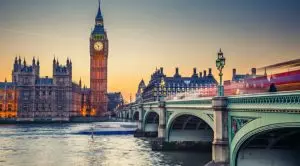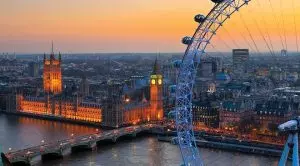 In the years after the door to online gambling was opened in the UK, the industry has boomed amid intense lobbying in favour of the sector in front of local lawmakers. However, the nation is also living with the menace of problem gambling and gambling-related harm although there has been alarming evidence about the rising gambling participation and gambling addiction rates in the country.
In the years after the door to online gambling was opened in the UK, the industry has boomed amid intense lobbying in favour of the sector in front of local lawmakers. However, the nation is also living with the menace of problem gambling and gambling-related harm although there has been alarming evidence about the rising gambling participation and gambling addiction rates in the country.
Several years ago, Ireland-based gambling operator Paddy Power led the transformation of the betting industry into a digital universe where anyone with a smartphone had access to a massive variety of gambling and sports betting options, with the services now being potentially available to anyone who had a casino in their pocket.
It was in 2016 when the co-founder of Paddy Power, Stewart Kenny, warned that things could be soon getting out of control, considering the fact that the overall amount lost in the online casino market in the UK at the time was estimated at £2.66 billion. According to him, that had become the biggest issue facing the nation that would soon be “like the frog in the boiling water”.
And he has managed to foresee the near future, because only six years later, online casino gambling has established its dominance in the UK, where it has surged by 47%, inevitably leading to an increase in the number of people seeking treatment for their gambling addiction.
Online Gambling Market of the UK Continues to Grow Exponentially
 For the time being, the UK is the biggest regulated online gambling market on a global scale, not to mention that it is also one of the most liberalised ones, with a great variety of gambling products and services legally permitted.
For the time being, the UK is the biggest regulated online gambling market on a global scale, not to mention that it is also one of the most liberalised ones, with a great variety of gambling products and services legally permitted.
Still, consumer protection measures are promoted across the industry, with problem gamblers being expected to have the strength to ban themselves from online gambling platforms. Customers who find it hard to control their gambling habits could take advantage of the GAMSTOP platform, which was set up and funded four years ago by representatives of the UK competent authorities and the gambling industry.
Anti-gambling campaigners, however, have criticised the scheme, saying that it was flawed because it was relatively easy for to be circumvented by players. Various websites offer tips on how to get around the self-exclusion restrictions – from registering an account under someone else’s name to changing minor personal details – but GAMSTOP supporters acknowledge that no system can be 100% infallible.
According to critics, UK Governments in the last 10 years have done little to enhance the regulatory and enforcement rules. Anti-gambling campaigners have also criticised the rising number of politicians who have developed closer ties to the local gambling sector, claiming that some lawmakers have accepted thousands of pounds in gifts and hospitality from gambling operators.
Apart from that, UK lawmakers have delayed the publication of their long-awaited review of the country’s gambling laws which was officially given a start in 2019. According to some people with knowledge of the situation, intense lobbying from proponents of the local gambling sector made some officials in the administration of former Prime Minister Boris Johnson liberalise or water down a few measures that were originally included in the review’s recommendations.
Official Number of Problem Gamblers Remains Relatively Low Unlike Actual Number That Remains Hidden
 Reports have shown that British punters’ losses on online casino games, sportsbooks, and other forms of gambling, amounted to over £14 billion for four of the past five years. Apart from that, a report published by the House of Lords unveiled that at least 60% of the industry’s profits are generated by the biggest spenders, who currently account for only 5% of gambling operators’ customers.
Reports have shown that British punters’ losses on online casino games, sportsbooks, and other forms of gambling, amounted to over £14 billion for four of the past five years. Apart from that, a report published by the House of Lords unveiled that at least 60% of the industry’s profits are generated by the biggest spenders, who currently account for only 5% of gambling operators’ customers.
As far as problem gambling is concerned, UK Government statistics show that about 138,000 adult residents of the country can be classified as gambling addicts, while about 36,000 children between 11 and 16 years of age are hooked on gambling. To make things worse, approximately 8% of the total number of suicides in the country – or about 400 – are estimated to be associated with gambling on an annual basis, not to mention the rest of the negative impact of compulsive gambling, including bankruptcy, broken relationships, homelessness, and crime.
Although the official problem gambling figures are worrying enough as they are, many analysts have warned that most gambling addiction cases actually remain hidden, because people are usually ashamed to share about their compulsive behaviour. This basically means that the actual number of people who feel the negative impact of problem gambling is much larger than the authorities announce and is likely to remain hidden for years unless the Government invests more money and efforts into programmes aimed at research, education, prevention and treatment of gambling-related harm.
As previously reported by Casino Guardian, online gambling’s significant rise in popularity can be traced to the country’s Gambling Act of 2005.
For years, gambling operators were allowed to advertise online casinos, poker, and sports betting on television and radio channels, and until 2014 online gambling operators targeting British customers were not even required to hold an operating permit issued by a competent regulatory authority. Of course, gambling companies have taken advantage of some blind spots and loopholes in the law ever since, cashing in on people’s addictions. Even more, they have unveiled various incentives and gifts such as free bets, cash deposits, or special offers, along with some VIP schemes to lure more and more people to their services.
Not All Operators Manage to Effectively Protect Their Customers from Gambling-Related Harm
 For the time being, the UK ranks as the biggest online betting market in the world, with an estimate of £9.1 billion. The US, Australia, Italy and France complete the top 5 online betting markets based on their size.
For the time being, the UK ranks as the biggest online betting market in the world, with an estimate of £9.1 billion. The US, Australia, Italy and France complete the top 5 online betting markets based on their size.
According to analysts, it is exactly the relaxed approach to the regulation and dangers of gambling that helped the country transform the sector into one of the largest regulated gambling industries on a global scale. Unfortunately, despite local gambling operators are required to take care of their customers, some of them do not take these obligations seriously and hardly do anything to prevent their customers from spending thousands of pounds or only give them a simple phone call instead of carefully checking or asking for proof for their source of income. Even more, they often tend to provide customers with incentives and special bonuses to encourage them to spend even more money on their services.
As revealed by a GAMSTOP spokesperson, the UK self-exclusion programme had helped 330,000 people since 2018. They also cited a survey, according to which 82% of gamblers had reduced their gambling since registering with GAMSTOP.
By 2021, many media hubs started have raised the alarm over a large wave of suicides of young British men suffering from gambling addiction. This unfortunate trend, combined with other specifics of the market, saw many lawmakers call for more restrictions to be imposed on the sector, along with a more serious crackdown on the industry.
The UK Gambling Commission (UKGC), which currently regulates the country’s gambling market, has responded to rising political and public pressure by unveiling stricter measures. It has already implemented some restrictions on online slots by reducing their spin speed after previously suspending the use of credit cards for gambling transactions. As Casino Guardian already reported, a significant number of fines have been imposed on gambling companies for violating a number of rules, such as a failure to identify problem gambling behaviour, poor or non-existent know-your-customer (KYC) protocols, as well as violations of anti-money laundering and social responsibility rules.
Strong Lobby of the UK Gambling Sector Pay for Political Support
 Although the UK Government has previously announced it would seek stricter measures to be imposed on the local gambling sector, reports have emerged that many politicians have actually been working in favour of the industry as lobbyists.
Although the UK Government has previously announced it would seek stricter measures to be imposed on the local gambling sector, reports have emerged that many politicians have actually been working in favour of the industry as lobbyists.
As Bloomberg reported, all but one of the pro-industry speakers who took part in a debate in March this year had accepted hospitality from various gambling operators. Some of them have even received direct payments in return for their efforts to convince the Government that things in the sector are not as bad as they are. Some of them are even part of the trade body representing the legal gambling operators in the country – the Betting and Gaming Council (BGC) – but also receive regular payments from some companies.
According to documents obtained by Bloomberg under so-called freedom-of-information requests, gambling firms and their lobbyists have meetings with UK Government officials almost every week. It turns out that in the 12 months to February 2022, representatives of the online gambling sector have had about 35 meetings with ministers and officials at the Department for Digital, Culture, Media & Sport (DCMS).
And the presence of a strong lobby seems to have been paying off. As mentioned earlier, four people with direct knowledge of the situation said that the last days of Boris Johnson’s premiership saw major reform proposals in the white paper on gambling to be either changed or fully dropped. The proposal for a gambling sponsorships ban aimed at limiting the number of partnership agreements between Premier League clubs and gambling operators was one of the measures that were dropped, along with the proposal aimed at implementing a mandatory levy on companies to fund research of gambling addiction research.
- Author


